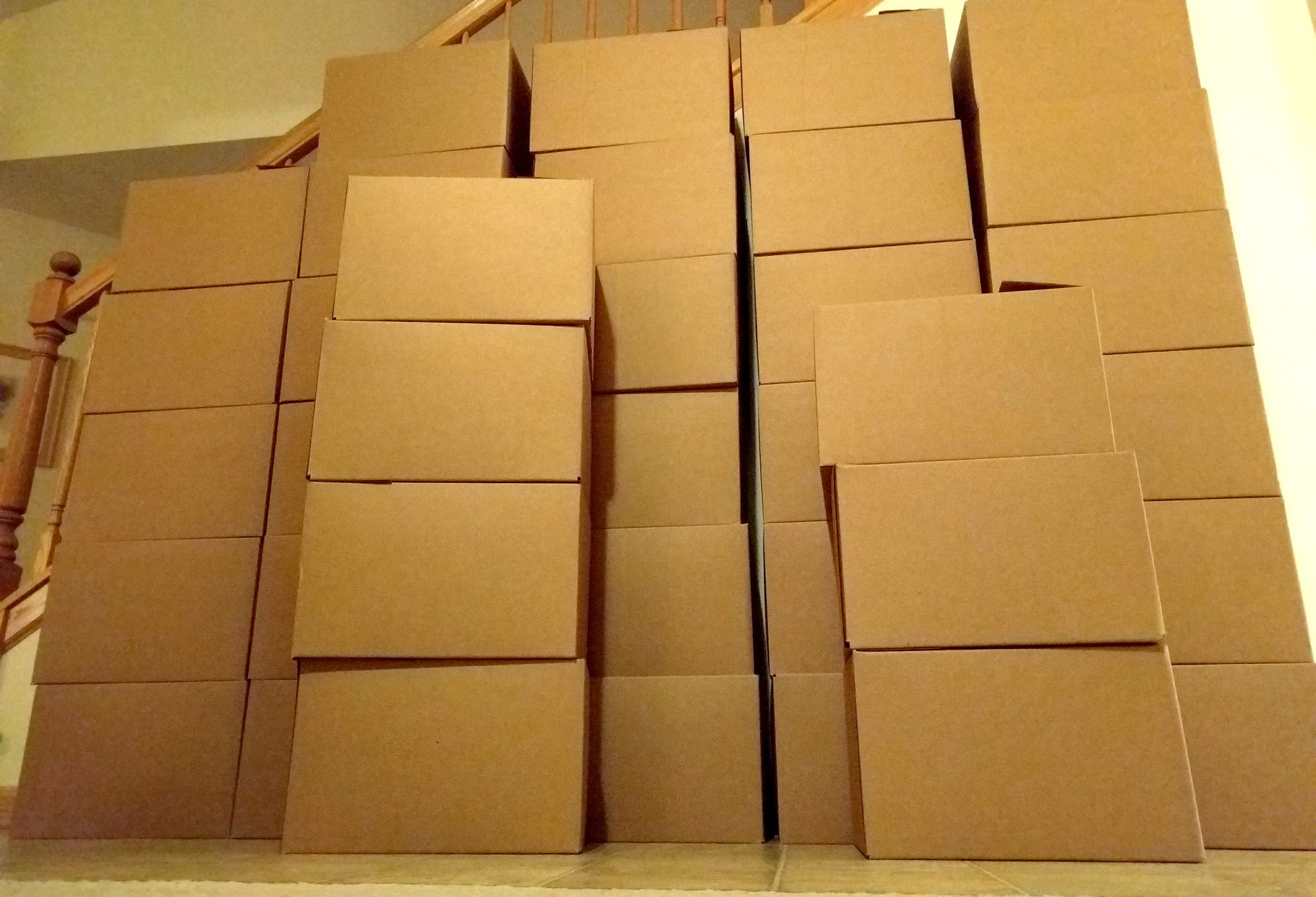
Boxed Books Bad
In anticipation of a move, I’ve put new carpet and paint in my living room. No big deal, right?
Wrong. The living room is where my books live.
Floor to ceiling books. A full wall of shelves. Stacks of books congregating on an end table. Books I’ve loved. Books I haven’t read. College textbooks. Coffee table books. Collectibles, sentimental keepsakes, nostalgia inducing paperbacks, bargain priced classics I’ll never get around to reading. Walls of memories. Walls of adventure. Walls of sadness and romance and heartache and saving the world from evil. It’s quite the room.
Sadly, to replace the carpet and paint, I had to entomb the adventures. Dozens of drab cardboard boxes swallowed my collection whole, and I’m beginning to understand the significance of their absence.
My once libraric(?) living room now houses no more than a dozen books. Most of those I’ve bought in the month since boxing the others. The room is cleaner, less cluttered, and I needn’t worry about morning sunshine bleaching the dust jackets. But the room is also less alive with the possibility of adventure. It’s less alive with nostalgia. Worst of all, it’s lacking a sense of memory.
Let me try to explain.
In our privileged part of the world, most of us have cell phones with data connections. How often do you pause, mid-conversation, to look up the answer to a question? How often to do pull out your phone to disprove a friend’s argument? I do it frequently. But what happens when you don’t have your phone?
A friend says, “William McKinley was the first president to appear on television.” You know that’s incorrect, and you reach into your pocket to prove the friend wrong, but you don’t have your phone. Frustrating, right? You subtly hint to your friend that he or she is mistaken, but your dates are fuzzy. You’re not absolutely certain you’re correct. Maybe by some fluke an inventor broadcast a tv signal decades before anyone else. You can’t be sure.
We’ve all grown to love the ability to artificially recollect factual details any time we want. No trips to the library required. No sojourns through the pages of Encyclopedia Britannica. When we want to confirm a fact, we pull out our phones, look it up, and feel intelligent. We also feel a pang of loss when those facts are beyond our reach because we accidentally left our phone in the bathroom.
That’s how I feel without my books. Sure, they’re not far away in a literal sense, but they might as well be.
I had no idea how much I’d miss them.
That same sense of frustration you feel when you can’t pull out your phone is what I feel when I can’t reference one of my books, and I reference them more often than I realized.
The Game of Thrones series kicked off a new season on HBO this past weekend. I wanted to scan the pages of book five to remember what happened last. I couldn’t. The other day, I commented on a post about the Alexander Hamilton musical, and I wanted to cite a specific paragraph I remember from Ron Chernow’s biography, but I couldn’t. Author Tad Williams will soon be publishing a new series of books in the world of his classic trilogy, Memory, Sorrow, and Thorn, a longtime favorite of mine, and when I read an update on his progress I wanted to remind myself of the magic.
That’s what books are, right? Magic. Tell me: Does a wizard wants to lose his wand? (Actually, I prefer wizards with staffs, but the point remains).
Occasionally, I’ll pull a book off the shelf and read a few random pages to recapture the tone and feel and pulse of it. Some books cling to our minds so completely that a single page, or a single sentence, or the simple mention of a main character can recreate in our imaginations everything we feel about that book.
I equate the experience to having children, in a way. When your kids are young, you experience so many wonderful moments together. You remember the smell of a pacifier or the clicking sound alphabet magnets make as they’re repeatedly slapped against the refrigerator door. You don’t think you’ll ever forget those things, and you never do. What you lose is the instigation to recall them.
Years later, you may not realize you still know those sounds. They’ll never cross your mind. Then, randomly, when you least expect it, you’ll hear a magnet clap against the fridge. You’ll catch a whiff of a friend’s baby’s pacifier. Your memory whirls. You see your baby as a baby. You feel the relief that comes when crying is replaced by that gentle sucking sound. You remember games and words on a refrigerator door. You remember laughter and sleeplessness and baby food tossed around the kitchen. If you’re a sentimental old fool, the nostalgia momentarily takes your breath away, and you quickly wipe away the tears. But soon the moment fades. Your memories retreat. And there they’ll lie dormant until instigation returns.
The beauty of surrounding yourself with books is you can initiate those memories whenever you choose. You can prompt yourself to remember. You can dive back into a world and relive it for as long as you desire. Books are more alive than any memory. They coexist with you. You remember their characters and plot. You remember their struggles and emotions. You remember what those books taught you or how they made you feel. Sometimes you remember your life as it was while reading a particular book. Maybe you read this one every morning on the train, and you read that one in snippets between college classes, and you read this one late at night, all alone, during the saddest days of your life. All of it comes back when you lift a book off a shelf and read a random page.
When your books are boxed, you haven’t lost the memories associated with them. You’ve simply lost the means to easily recollect. You forget what you know, because the triggers to remind you are gone. It’s far worse than leaving your phone in the bathroom.
Soon I hope to free the books. It won’t be easy. Imagine the emotions and memories that will spring forth from every box. I’d like to say I can’t wait, but there’s a reason I usually only revisit one book at a time. The emotional onslaught of reliving hundreds of books in a day might be more than I can handle.
Maybe I’ll unbox them in stages…

Also published on Medium.